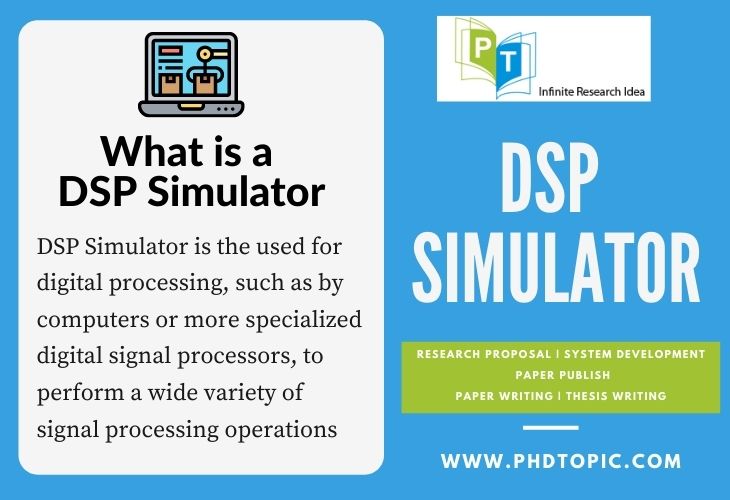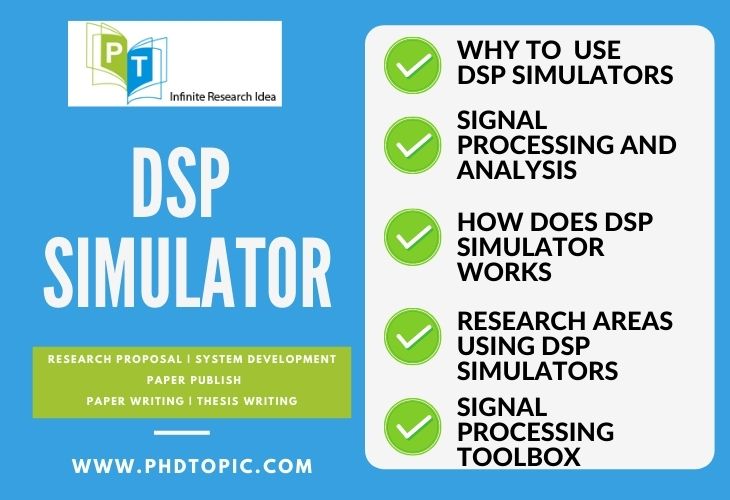DSP simulator are of immense importance in signal processing methods. Digital signal processing is the method in which digital signals are processed using appropriate algorithms for obtaining useful information. It is defined as follows,
- Digital signal processing starts with the transformation of real-time analog signals into digital replicas.
- It is performed with the help of algorithms and analog to digital conversion software.
- The real-world signals include audio, video, etc., where it is the modulated and enhanced sound effects from a processed audio signal.
A DSP simulator plays a key role in any digital signal processing project. This is because it is only the simulators that help us identify the working efficiency of the system that a researcher attempts to design.
We have a few best-renowned experts who are well known among research scholars worldwide for providing extraordinary research guidance in digital signal processing projects. With their support, we have brought out a complete overview of DIP simulators here. First, let us start with the use of DSP simulators.
WHY TO USE DSP SIMULATOR?
Digital signal processing has a wide variety of applications. A system of digital signal processing can be made successful only when its performance and efficiency are tested using simulation tools. The simulators perform the following functions.
- Comparison of signal traces by simulation is possible (by extraction of desired features from the samples)
- Diagnosis of processed data should be precisely performed (Not all data samples give better results. So faults in the measurement may impact determination of process behaviour)
- Analysis of signal data by measuring it to identify the defects in the system components (A/D converters and sensors)
In this way, simulation becomes important in digital signal processing methods. Our engineers are very well qualified and experienced in working with advanced algorithms and protocols for simulation.
The team of experts with us can solve your doubts, if any. We will make your research experience very interesting by giving you an interactive and easy approach to instant technical support. You are also free to contact us at any time as we have got the 24 hours customer service support team with us. We are eagerly waiting to guide you in your DSP Simulator research. Now let us talk about the few DSP simulation methods for signal processing and analysis.

DSP SIMULATOR FOR SIGNAL PROCESSING AND ANALYSIS
There are various categories of DSP simulators that researchers commonly use. You can get the help of our technical research experts in handling these simulators.
- MATLAB or (SIMULINK)
- Whatever that you would need for complete signal processing is provided by MATLAB and Simulink
- The following signal processing toolboxes are present inbuilt in MATLAB
- Wavelet toolbox
- Signal processing toolbox
- Data acquisition toolbox
- MATLAB has the properly formulated digital signal processing algorithms and interfaces for real-time input and output processing. So it allows you to perform the following tasks
- Signal transformation
- Pre-processing
- Filtration
- Visualization
- Signal analysis
- Feature extraction
- Signal streaming
- SciPy
- SciPy is one of the best digital signal processing tools that provides for the following
- Interpolation algorithm (B-spline transform algorithm) in both one and two dimensional data processing
- Tools for designing filters (filter theory)
- Transformation (provided by the formalisms of transfer-function)
- SciPy is one of the best digital signal processing tools that provides for the following
- Java-DSP
- Java digital signal processing software is free to access online
- OFDM or Orthogonal Frequency Division Multiplexing is understood easily by Java – DSP software tools
- Octave
- Advanced signal processing methods can be developed with Octave
- Fast Fourier transform functions are also present in it.
- FFTPACK and FFTW library Computations are also possible using Octave
You can get the advice of our experts regarding the choice of these simulators that can best suit your research objective. You should have used some of these simulators in your previous projects. But the simulator that should be used for digital signal processing should meet certain requirements.
Each DSP simulator has its own toolboxes that can be of great importance in simulation. Let us see such tool boxes available with MATLAB.
TOOLBOXES USED IN MATLAB
The following are the MATLAB toolboxes used for the simulation of digital signals. These toolboxes are quite commonly used in digital signal processing projects by researchers all around the world.
- Wavelet
- DSP System
- Acquiring data
- Machine Learning
- Signal processing
MATLAB toolboxes support much-advanced applications like smart device applications, the Internet of things, and much more. SoC, FPGA, and the other ready-to-be-implemented tool kit designs are of great use in recent applications.
Our engineers have updated themselves with all those recent tools and software for signal processing methods designing and simulation. So you can rely on it with more confidence. We will be there with you through your path of research dsp simulator. Now let us see in brief about the working of digital signal processing simulator.

HOW DOES DSP SIMULATOR WORKS?
Modeling of simulation tools depends primarily on the application. For this reason, we suggest talking to our experts before choosing a DSP simulator for your project. The modeling can become a tedious task if done manually for including or excluding the parameters under study. The following are the steps followed in modeling the best DSP simulator,
- Initialization and adjustment parameters of the models used for simulation
- Real-time simulation is began
- Evaluation of signals via simulation
- Derivation and measurement of the state of signal processing systems processes (by comparing)
- Process related information is collected and is given to a module (usually global expert module)
- Information is then compared with the data on simulators. Finally the end point is reached when a satisfying result is obtained.
The simulators are thus the backbone of the functioning of signal processing systems because they play an important role in systems designing. The massive resources that we will provide you at once you register with us for your research phd guidance will actually bring you in-depth clarity about the DSP simulator design and functioning.
As of now, you would have used simulators only as tools to analyze your project. So we will give you ideas to understand how a simulator is designed at first hand. Now let us have some idea on the importance of signal processing toolboxes.
FUNCTIONS OF SIGNAL PROCESSING TOOLBOX
Digital signal processing has some operational limitations which can be easily rectified by adopting many signal processing toolboxes.
We personally make many toolboxes for signal processing systems where we go forward and adopt new technologies and features. Now the question that comes is what the crucial applications of signal processing toolbox are. Let us see about it in detail below.
- Distortion and measuring signal to noise ratio
- Designing filters
- Smoothing
- Correlation and coding
- Sampling
- Predicting the similarity in signals
- Estimating power (spectrum)
- Prediction of bandwidth and peak
In the first place, either the standard toolboxes can be adopted, or systems that suit your feature needs can be adopted. You can support yourself by making the entire system adaptive to new technological intake.
We will aid in such cases without any delay. We will come in whenever you need our support and put in all the efforts that we can and make your model register progress. Now let us have some ideas on the toolboxes with the MATLAB for signal processing applications.
The following are the important MATLAB toolboxes useful for digital signal processing. Look into them. We hope you have some idea about these toolboxes. In case you have some doubts about their functioning, just feel free to talk to our experts.
- Audio toolbox
- Processing of audio signals
- Extracts required features
- Signal transformation
- Audio, speech and acoustic signal analysis
- Toolbox specific to bio signals
- For processing bio signals
- Analysing signals like ICG, EMG, EDA and ECG
- Signal classification
- Machine Learning applications
- System toolbox (DSP)
- For processing of all types of digital signals
- Deep learning and machine learning tools
- Analysis of filter design
- For signal streaming purposes
- Communication toolbox
- RF signal processing
- Modulation purposes
- Channel coding
- RF Propagation methods
- Deep learning solutions
Smart system filters can also be designed with the help of these toolboxes in MATLAB. It can be potentially used in embedded systems and smart device applications using the codes like C++, HDL coder, Verilog, VHDL, and C.
MATLAB toolboxes also support the use of deep learning and fuzzy logic algorithms. Signal streaming is also possible with the use of these functions. R2020a, R2019a, R2018a, R2017a, R2020b, R2019b, R2018b, R2017b, and R2017b are all the versions of MATLAB toolboxes.
Our experts are well versed in working with all these updated versions of toolboxes. If you want to lead the field of research in DSP simulators and wish to build expertise, we guarantee you with extreme happiness that we will make a positive impact to support your dream. Now let us see the significant project areas in DSP simulators.
PROJECT AREAS USING DSP SIMULATORS
The following are the key research areas in DSP simulators. The research in these topics is gaining importance these days owing to fulfill the demands over signal processing applications. Now let us see the details of prominent project areas using DSP simulators.
- ECG extraction
- Analysis of Gait for differentiating Huntington’s disease from Parkinson’s
- Feature extraction (EKG pre processing)
- EKG stress analysis
- Detection of driver stress (EMG)
- Estimation of age (using EKG)
- Ragas (Indian) effects on EKG
- Detectors for bradycardia and arrhythmia
- Algorithm for Wave classification (EKG)
- Disabling automatic image processing in ultrasound (for obtaining raw data)
- Pulse oximeter data for extracting breath and heart rate
- Optimal circuit building for the EKG signal recording
- Compression of data (huge amount of data being processed has to be compressed for making optimization in storage)
We have now made a potential note on projects in DSP simulator. We hope that we have made a motivation in your research path possible via this description. We are sure to support you in your future research since we understand that signal processing is an evolutionary research topic. The moment you approach us, we will make your work easier and more interesting. So make sure to leave us a message so that our technical team gets connected with you soon.
